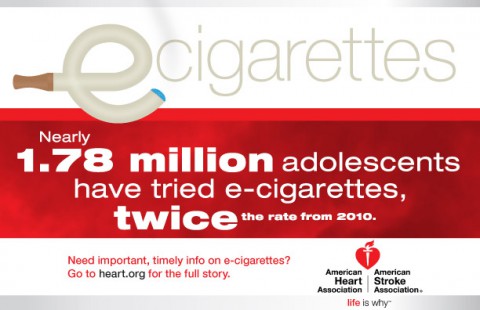 Nashville, TN – Six months after issuing a public health advisory on the use of electronic cigarettes, the Tennessee Department of Health advisory remains in effect.
Nashville, TN – Six months after issuing a public health advisory on the use of electronic cigarettes, the Tennessee Department of Health advisory remains in effect.
Additionally, the department has petitioned the U.S. Food and Drug Administration for regulation of electronic cigarettes and similar electronic devices that produce emissions or “vapor” that contain, despite the perceptions of many, much more than just water vapor.
TDH urges caution for consumers using or considering the use of electronic nicotine delivery systems, including electronic cigarettes and other emissions-producing products. Since the June 11 initial advisory, TDH officials said too many questions remain unanswered about electronic cigarettes and similar emissions-producing devices. It’s time, they said, for consumers to have safeguards from potential health risks.“Currently, there are not adequate safeguards or regulations regarding those producing electronic cigarette components including what chemicals may be used, and no clear requirements to warn consumers of potential risks and hazards of inhaling these varied emissions deeply into the lungs,” said TDH Commissioner John Dreyzehner, MD, MPH. “Some are also suggesting health benefits regarding these products that are not appropriate or adequately supported by evidence.”
The electronic cigarette industry has grown rapidly and a number of cities, states and countries have enacted legislation regarding their use. Tennessee law prohibits their sale to minors, for example.
While some manufacturers and marketers of the devices have claimed electronic cigarettes may be an alternative method to help conventional tobacco cigarette users quit, many health officials have concerns about those claims and believe the use of flavors and unrestricted marketing may be creating another generation of nicotine addicts among our youth. The CDC recently reported electronic cigarette use increased three fold among youth from 2011 to 2013.
“Nicotine is not a harmless chemical,” said TDH Chief Medical Officer David Reagan, MD, PhD. “It has been shown to be more addictive than many legal and illegal drugs, and it can affect the circulatory and nervous system in both humans and animals. Because there is no government agency now regulating the amount or quality of nicotine delivered, many in the health and medical communities are concerned that some electronic cigarettes may contain high levels of nicotine and other potentially dangerous ingredients that may be harmful and addictive.”
To see a copy of the Tennessee Department of Health’s advisory, visit: http://health.state.tn.us/downloads/PHA_ElectronicTobacco.pdf
Warren said people who take the emissions into their mouths and lungs, not knowing what the aerosol could contain, may be absorbing a “literal recipe for disaster.” He said until more is known and additional research conducted, those who want to quit smoking should use scientifically-approved and controlled nicotine replacement therapies.
About the Tennessee Department of Health
The mission of the Tennessee Department of Health is to protect, promote and improve the health and prosperity of people in Tennessee. TDH has facilities in all 95 counties and provides direct services for more than one in five Tennesseans annually as well as indirect services for everyone in the state, including emergency response to health threats, licensure of health professionals, regulation of health care facilities and inspection of food service establishments.
Learn more about TDH services and programs at http://health.state.tn.us/.



